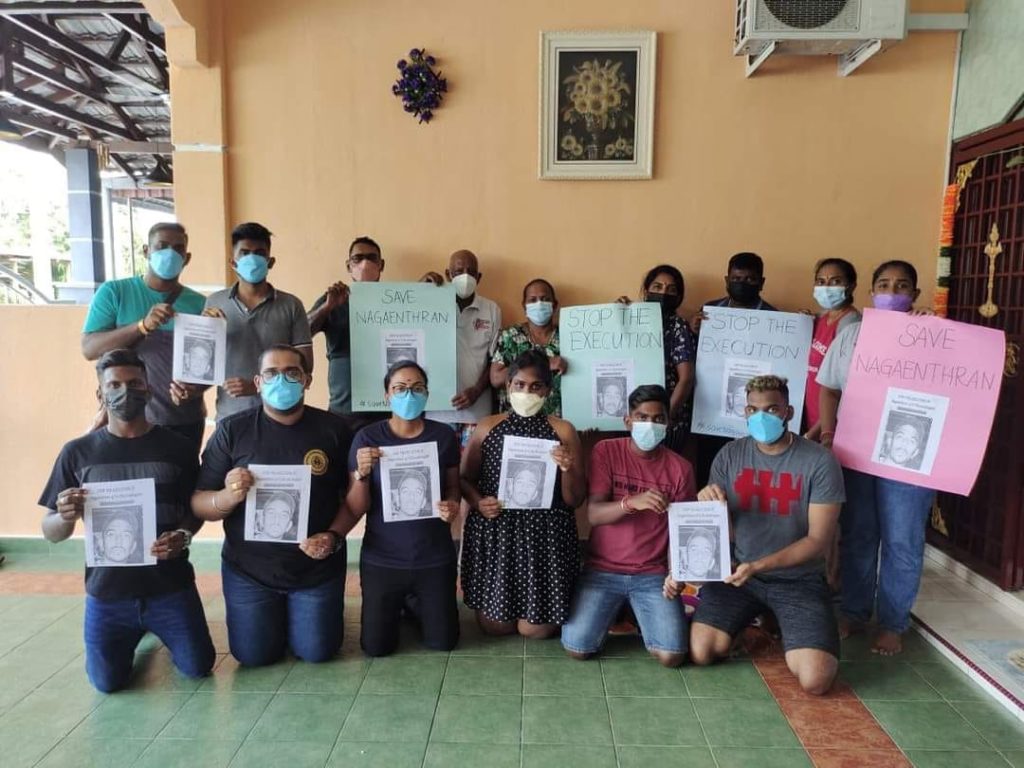
By Nesha Pany and Firdaus Rundi
KUALA LUMPUR, May 27 – The recent execution of a Malaysian man, Nagaenthran Dharmalingam in Singapore triggered a global outcry. While protests all over the world arose condemning the draconian laws, the abolishment of death penalty remains contentious in Singapore and even in Malaysia. Had Nagaenthran been in Malaysia, would his fate have been different?

When Dangerous Drugs Act (DDA) was first established in Malaya by the British in 1952, it did not include the death penalty. Death penalty was initially imposed for murder but in 1983, this punishment was made mandatory for drug traffickers too. This was due to the surge in drug use, prompting the then Prime Minister Datuk Seri Dr. Mahathir Mohamad to declare drugs as a national threat, attesting drug use to be a major incitement to violence.
Today, death penalty can be applied for 33 offenses in Malaysia, 12 of it which is mandatory. These offences include homicide, drug trafficking, firearm with intent to kill or harm and treason.
According to figures by Amnesty International, 1,281 people were on death row as at February 2019. Forty-four percent of these inmates are foreign nationals and out of that 73 percent of them had been convicted with drug trafficking, topping the list of offences that involves the capital punishment.
Although Malaysia has declared a moratorium on executions in July 2018, individuals are still being sentenced to death. Chiara Sangiorgio, an advisor at Amnesty International commented, “While there is some progress with a moratorium in place, there is a lot of arbitrariness and discrimination when it comes to those sentenced to death.”

The available limited data suggests that a majority of Malaysian inmates on death row come from the lower socioeconomic backgrounds. Very seldom a rich drug lord gets caught and given the death sentence or at least it is a rarely reported event in the media.
A typical example of this disproportionality would be the sentencing of Hairun Jalmani on October 15th 2021 in the state of Sabah. The 55-year-old woman was sentenced to death for possessing and distributing 113.9g of methamphetamine in 2018. At the time of her arrest, she was a single mother in Malaysia’s poorest state, trying to support her 9 children. Looking at her circumstances, questions do arise on how justice can be served by sentencing Hairun to death.
In cases like Hairun’s verdict, it is implied that the existing harsh laws end up punishing the low-level offenders with political pressure to demonstrate a commitment to fighting drugs playing a part in the background, while drug lords are let free and unpunished. This is also why many countries around the world have abolished capital punishment as it is considered to be arbitrary and a violation of the right to life and how it fails to take the mitigating factors into account, where circumstances of the committed crime or the offender is not taken into consideration. It is also arguable if the punishment is appropriate and proportionate to the crime.
The call to abolish death penalty is growing in Malaysia, particularly these recent years. More Malaysians are open to having a discourse about this matter publicly especially on social media, calling forth a change. Politicians have also brought this issue up numerous times, urging the government to follow through its plans to scrap the death penalty as was initially proposed by former law minister late Liew Vui Keong.
There has been no credible evidence that death penalty deters crime, Batu Kawan Member of Parliament Kasthuri Patto has meanwhile stated, “Over the years, the number of men and women on death row in Malaysia has increased. But there is no sign of a reduction, with the crime rate still remaining high.”
Calling for a more humane solution, she said to tackle crime rates, there is a need to understand the root causes of crimes associated with adverse social and economic conditions in order to find better solutions.
As of today, 108 countries have abolished the death penalty for all crimes, while 144 countries have abolished the death penalty in law or practice. Malaysia is one of the 54 countries that still impose death sentences.
–WE